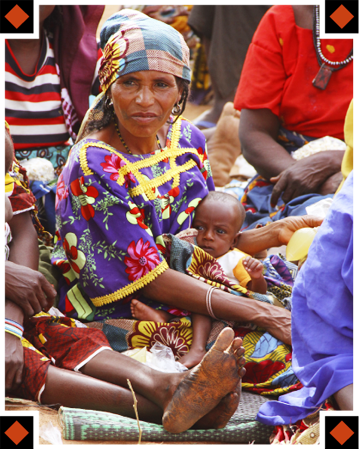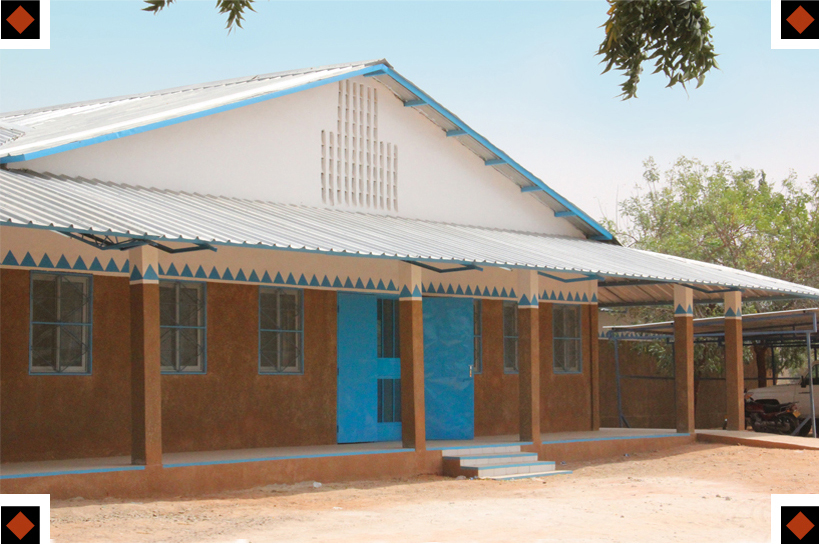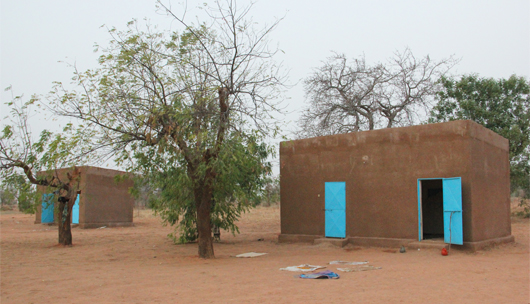
An unspeakable problem.
An underserved population.
An undeterred physician who championed their cause.

BY DIANE DUKE WILLIAMS
For L. Lewis Wall, MD, a dream has come true.
For almost 20 years, he worked doggedly to build a hospital in one of the world’s poorest countries to treat women with a devastating childbirth injury. His dream became reality this past February, when the 42-bed Danja Fistula Center opened in Niger, a landlocked, arid country in West Africa. The facility is dedicated to repairing obstetric fistulas, childbirth injuries that result from untreated prolonged labor, which leave women — and often girls — with a complex mixture of medical and social problems.
“It was wonderful to be there that day,” says Wall, professor of obstetrics and gynecology and of anthropology. “This hospital may seem small by American standards, but it will make a huge difference in the lives of so many women who have suffered needlessly for too long.”
Obstetric fistulas are holes between body cavities that open up following severe tissue damage. They occur in women of all ages but are more common among those who marry young and whose narrow pelvises make them susceptible to childbirth trauma. In developing countries, where women tend to give birth at home rather than in a hospital, days of pushing during difficult labor can result in terrible injuries.
Fistulas can form between the vagina and the urinary tract or rectum. The result is extremely unpleasant; women are left steadily leaking urine and sometimes feces. While the condition can usually be fixed with surgery, a lack of health care options leaves many who suffer in this way with no hope of recovery.
To make matters worse, many African women who develop fistulas are divorced by their husbands, cast out by their families and must eke out a meager living with no marketable skills. Often, they are forced to live humiliating, desolate lives on the edge of their villages.
“When these women get a fistula, life is basically over for them,” Wall says. “They become social pariahs. With an inexpensive surgical repair, we are able to give them back their life and dignity. It’s astonishing.”
A tree-lined dirt road
leads to a new hospital
for African women.
L. Lewis Wall, MD, and his wife, Helen, donned traditional African garb for the opening of the Danja Fistula Center earlier this year.


Exterior View
The Danja Fistula Center offers hope to thousands of women who have suffered severe injury during childbirth.

Inside the O.R.
Lewis first encountered the problem of fistulas while working as an anthropologist in northern Nigeria on a Fulbright-Hays fellowship. Eventually, he decided the world needed doctors more than it needed anthropologists. After graduating from medical school, he became fascinated by urogynecology, a subspecialty that treats women who have urinary or fecal incontinence and prolapse of the vagina, bladder or uterus.
In 1995, after visiting a large fistula hospital in Ethiopia, Wall envisioned opening a similar facility in West Africa, where fistulas are prevalent.
He founded the nonprofit Worldwide Fistula Fund to raise money to construct hospitals to repair fistulas. The fund has helped support and build a number of fistula centers in Africa. It also has provided money to train local doctors to perform the surgical procedure and to help raise awareness of the problem.

Accommodations for patients’ families give them a place to stay during treatment and recovery.
In Niger, among the scattered grasslands on the edge of the Saharan desert, people grow millet and raise sheep, cattle and goats. The majority of people live on less than $1 a day. There are very few personal or private resources for medical clinics or hospitals, so getting the Danja Fistula Center built was much more difficult than Wall originally anticipated.
“I thought I was fairly realistic because I had lived in West Africa for two years,” he says. “But we had to contend with unexpected obstacles — bureaucratic hassles, insects, a lack of communication and supplies, and people who thought their own interests would be threatened by such a facility.”
He also had to raise about $1 million.
Large contributions from the Trio Foundation of St. Louis, South African musician Dave Matthews and an executive at Merrill Lynch helped the Worldwide Fistula Fund reach its goal. The fund also received many small personal donations, including $35 from a potluck hosted by a group of elderly women in New York.
“This was not my individual achievement,” says Wall. “It was a result of the efforts of thousands of people.”
Mark J. Manary, MD, the Helene B. Roberson Professor of Pediatrics, understands some of the obstacles Wall faced in getting the hospital built. Over the past 15 years, Manary has spent a great deal of time in Africa, where he developed Project Peanut Butter, a non-profit organization that produces a peanut-butter mixture to treat children with malnutrition.
“Lewis’ work removes a huge burden, a permanent scar, from the lives of thousands of African women,” Manary says. “I admire his commitment and persistence.”
Each year, about 1,000 women will have fistula surgery in the new facility, which is affiliated with an existing leprosy hospital run by a Christian missionary organization. Some will travel hundreds of miles by truck or bus to get there.
Aside from repairing fistulas, the hospital will oversee outreach efforts to promote maternal health and reduce childbirth deaths. It also will educate women about microfinance to teach them about business and empowerment.
The new hospital is part of a grand vision to eradicate fistulas worldwide by building fistula centers that will serve as focal points for maternity care and public health outreach in the world’s poorest countries.
“For starters, we hope this hospital will help countless women and alleviate human suffering,” Wall says. “We also hope it will advance women’s rights and gender equality. There still is a lot of work to do. But for now, I’m just going to enjoy this."






